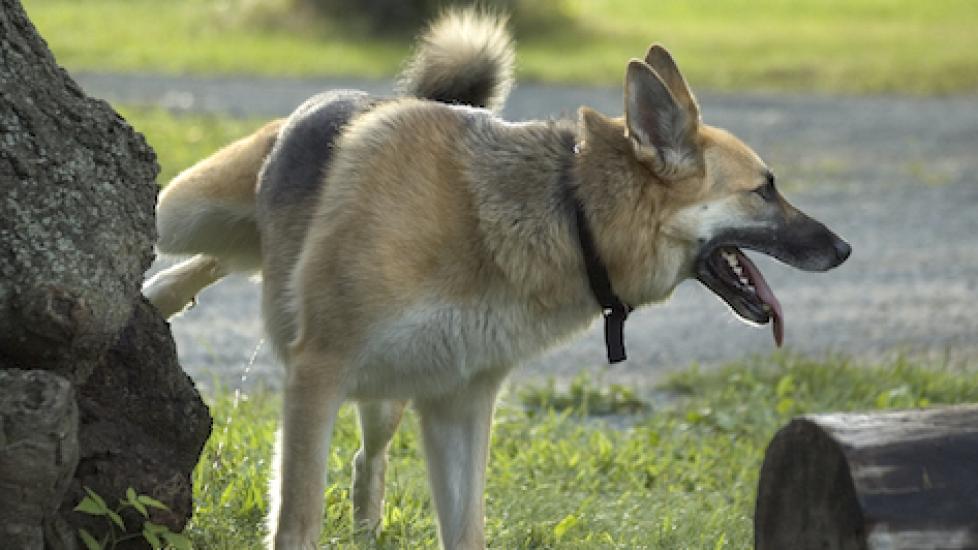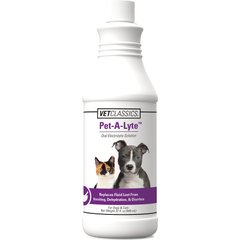How to Treat Hematuria in Dogs
By Dr. Jennifer Coates, DVM
If your dog has been diagnosed with hematuria (blood in the urine), this is what you can expect to happen next.
- Medication: Your veterinarian may prescribe any of a number of medications (e.g., antibiotics or urinary acidifiers) depending on the underlying cause of your dog’s hematuria.
- Surgery: Surgical procedures, like those that remove bladder stones, may be necessary in some cases.
- Diet: Special diets may be prescribed, particularly if your dog has bladder stones.
What to Expect at the Vet’s Office
The veterinarian will need to determine what disorder is to blame for your dog’s hematuria. He or she will start with a physical examination and complete health history, often followed by some combination of diagnostic tests. Possibilities include:
- A blood chemistry panel
- Complete blood cell count
- Urinalysis
- Urine culture and antibiotic sensitivity testing
- Abdominal X-rays and/or ultrasound
Appropriate treatment will depend on the results of these tests and the eventual diagnosis. Some of the more common disorders that cause hematuria in dogs are:
Urinary Tract Infection — Canine urinary tract infections are treated with antibiotics. Sometimes a urine culture and antibiotic sensitivity testing is necessary to determine what antibiotic will resolve the infection. If the infection occurs in conjunction with struvite bladder stones, a special diet or urinary acidifier will also be necessary to dissolve the stones.
Bladder Stones — Struvite bladder stones can usually be dissolved with a prescription diet or with medications that acidify the urine. Calcium oxalate and other types of bladder stones are best removed via surgery.
Cancer — Cancer of the urinary tract can cause hematuria. Treatment may include surgery, chemotherapy, radiation, or palliative therapy.
Trauma — Injuries can lead to bleeding within the urinary tract. Rest, pain relief, symptomatic/supportive care (e.g., blood transfusions), and sometimes surgery is necessary if a dog is to recover.
Bleeding Disorders — Conditions that disrupt the normal formation of blood clots can cause hematuria in dogs. Treatment depends on the underlying cause (e.g., Vitamin K for some types of poisonings).
Benign Prostatic Hypertrophy (BPH) — Unneutered male dogs are at risk for BPH, which can cause hematuria. Neutering is usually curative.
Vet Recommended Health Support
- Purina Pro Plan Veterinary Diets FortiFlora Powder Probiotic Digestive Supplement for Dogs, 30 count$30.99Chewy Price
- VetClassics Pet-A-Lyte Oral Electrolyte Solution Dog & Cat Supplement, 32-oz bottle$17.99Chewy Price
- Nutramax Welactin Omega-3 Liquid Skin & Coat Supplement for Dogs, 16-fl oz$27.99Chewy Price
- Fera Pets USDA Organic Pumpkin Plus Fiber Support for Dogs & Cats, 90 servings$34.95Chewy Price
What to Expect at Home
Dogs who are under treatment for hematuria should be closely monitored and encouraged to eat and drink. When dogs are taking antibiotics for a urinary tract infection, they should take the entire course, even if their condition rapidly returns to normal. Follow your veterinarian’s instructions regarding any other medications that have been prescribed.
Dietary modification is an important part of managing some dogs with hematuria. Feeding canned and/or prescription food and keeping fresh water available at all times are common recommendations.
Questions to Ask Your Vet
Ask your veterinarian what the possible side effects are from the medications your dog is taking. Find out when he or she next wants to see your dog for a progress check and whom you should call if an emergency arises outside of your veterinarian’s normal business hours.
Possible Complications to Watch For
Talk to your veterinarian if you have any questions or concerns about your dog’s condition.
- Some dogs who take medications can develop side effects such as loss of appetite, vomiting, diarrhea, etc. Make sure you understand what your dog’s reaction to any prescribed medications should be.
- It is possible for a dog to appear to be on the road to recovery and then suffer a setback. If your dog strains to urinate, produces only a small amount of urine at any given time, urinates very frequently, seems to be uncomfortable while urinating, or the hematuria worsens, call your veterinarian.
- In rare cases, dogs with hematuria may become unable to pass urine, which is potentially fatal if left untreated. If you think your dog may be unable to urinate, call your veterinarian immediately.
See Also
Image: Jason X Pacheco / Shutterstock
Related
Particles in the Urine in Dogs
Hemoglobin and Myoglobin in the Urine in Dogs




